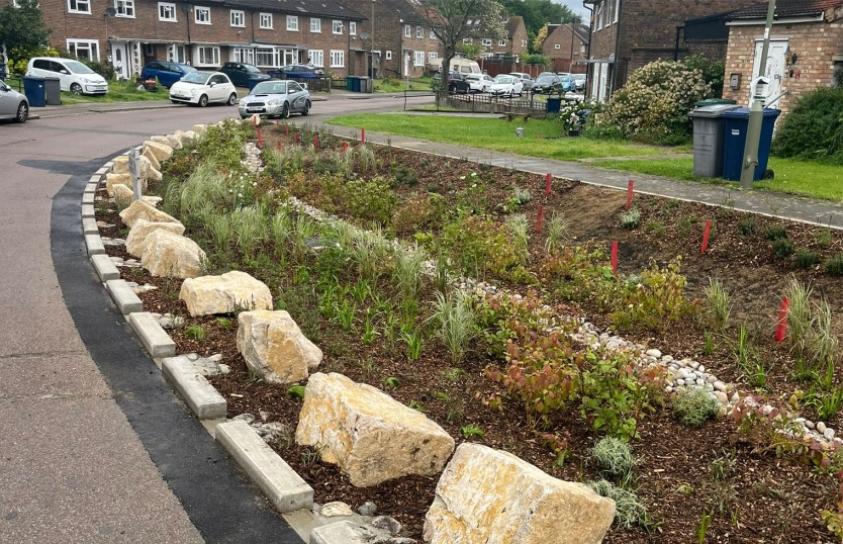
Muswell Hill rain garden
Rain gardens are being installed across Barnet to help reduce the risk of localised flooding and reduce the impact excess water has on roads and pavements.
The sustainable water drainage systems feature specially selected plants, shrubs, and other greenery. They are designed to absorb rainwater to help stop sewer systems becoming overwhelmed – one of the main causes of localised flooding.
In February this year, Barnet’s Cabinet approved a five-year £97m road improvements package, part of which funds these rain gardens to help prevent water sitting on the road surface, causing potholes and cracks.
The first locations are in Colney Hatch Lane and The Vale, both in Muswell Hill, and the council has plans to introduce more across the borough.
The eco-friendly system also provides valuable habitats for wildlife in urban areas and creates more green spaces for local people to enjoy due to the rain gardens' attractive and natural design.
Cabinet Member for Environment and Climate Change, Cllr Alan Schneiderman, said:
“Our borough is increasingly experiencing the effects of climate change, with more frequent flooding due to torrential rains.
“To mitigate the impact of flash floods in our communities, we are investing in various flood alleviation measures, including the implementation of rain gardens in the most affected areas.
“Rain gardens are an eco-friendly solution that not only help reduce flood risks in flood-prone areas but also enhance the natural environment and boost biodiversity within the borough.”
Just this week the BBC reported that flash flooding had been described as the main environmental risk to people living in the capital by the Greater London Authority (GLA). One solution put forward is that London should become a "sponge city" - an urban area designed to absorb and hold rainwater.
Roger Chapman, Chair of Barnet Green Spaces Network, welcomed the approach. “It is good to see practical measures being taken by Barnet Council to tackle flooding and drainage issues and at the same time improve biodiversity. We are working with the Council to develop ideas for helping to overcome these problems in Barnet's green spaces as well.”
In January, Barnet’s Cabinet voted to approve a new sustainable drainage and flood defence strategy aimed at reducing future flood risks in the borough.
The strategy encourages building developers to include sustainable flood defence practices in their design plans, such as installing rainwater harvesting and water butts. Natural methods such as planting trees and shrubs to absorb excess rainwater can also prevent the flooding of streets and houses in urban areas.
The Sustainable Drainage Strategy (SuDS) states that developers should consider implementing SuDs in all developments – no matter how large or small. The strategy has been drafted to avert the threat of flooding caused by a growing borough population, which will add pressure to the current drainage measures in place.
